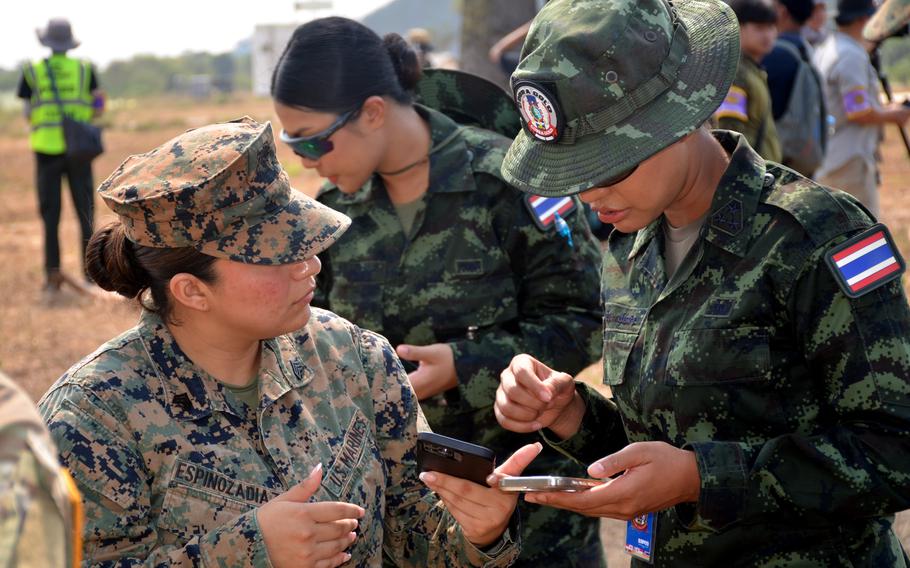
A U.S. Marine and a Thai soldier exchange contact information ahead of a Cobra Gold amphibious assault on Hat Yao Beach, Thailand, March 1, 2024. (Alex Wilson/Stars and Stripes)
RAYONG, Thailand — Thousands of troops from 30 nations started for home Friday as the largest military exercise in mainland Asia officially came to a close.
More than 9,000 service members from 30 countries — including 4,500 troops from the U.S. Army, Navy, Air Force and Marine Corps — gathered throughout Thailand beginning Feb. 27 for Cobra Gold, the world’s longest-running annual exercise of its kind.
Over nearly two weeks, those troops made amphibious assaults and airborne drops, fired live artillery rounds, trained for jungle survival and took part in community relations projects and other activities.
Lt. Col. Lindsay Mathwick, commander Combat Logistics Battalion 15 and Marines aboard the amphibious transport dock USS Somerset, said she visited each training area where members of the 15th Marine Expeditionary Unit were engaged.
“We learned so much as a force,” she told Stars and Stripes by email Friday.
“Some of our Marines also had the opportunity to participate in community relations events with locals — a truly memorable experience,” Mathwick wrote. “But what truly moved me and showed me the impact we have coming to participate in these exercises, was seeing the Marines laughing, eating, and sharing stories with each other during their breaks.”
Marines also exchanged photos, uniform patches and information that “makes us a more powerful team,” she said.
This year’s exercise served as a reminder that the United States and its allies share common goals, said Army Maj. General Matthew McFarlane, deputy commander of I Corps, the overall joint force command for Cobra Gold.
“Everyone is interested in participating here to build relationships with regional partners that are interested in a stable and secure, free and open Indo-Pacific,” he said on a conference call Thursday. “That’s a key message that we got from everybody.”
Thailand, the host nation, is a “key partner in the region” for building those relationships and maintaining readiness, McFarlane said. The nation has maintained official diplomatic ties with the United States since 1833, nearly 200 years.
Cobra Gold is “a positive example of multilateral cooperation, as is demonstrated by the continued increase in participating nations; everyone walks away from this better and able to solve problems together,” he said.
A key takeaway this year is the growing importance of cybersecurity and cyberwarfare, McFarlane said. Other lessons included the importance and utility of equipment and technology, such as those used to communicate between nations.
This was McFarlane’s fourth Cobra Gold; his first was in 1996. Since then, the exercise has grown from primarily combat operations between U.S. and Thai forces to vast, multinational training with many more scenarios and drills.
“So, it’s certainly a wider variety and a larger contingent working at multiple echelons,” he said.
Planning for next year’s Cobra Gold is already underway, though it’s too early to provide details, McFarlane said.
“We’re building upon the progress to date, but that doesn’t mean we’ll do the exact same thing and just do it bigger,” he told Stars and Stripes. “Sometimes we’ll add different things. You know, the senior Thai military leadership are going to be specific about different aspects that they want to train or be better at.”